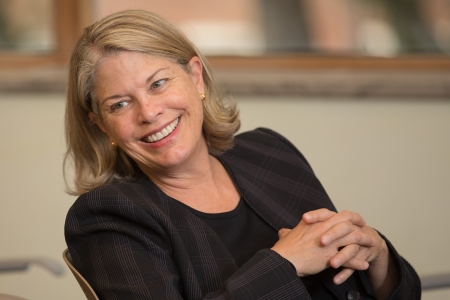
CAMBRIDGE, MA — Monroe C. Gutman Library at the Harvard Graduate School of Education announced today that Alison Head, founder and director of Project Information Literacy (PIL), will be a visiting scholar for the 2019–20 academic year. During her time at HGSE, Head will launch the latest research by PIL, a multi-institutional and qualitative study looking at the future of information literacy among college students.
"It is a very exciting opportunity to have Alison at HGSE," said Alex Hodges, HGSE Librarian and Director of Gutman Library. "She is one of the world’s leading experts on information literacy – how we find, evaluate, use, and create information — and how students’ strategies impact teaching and learning in our so-called post-truth times.”
PIL’s research will examine today’s information environment and the impact of one of its most defining features: the impact of algorithms, pieces of computer code that make lightning-fast calculations and decisions for and about us. Grounded in knowledge gained from PIL’s decade of large-scale studies on how college students find and use information for course work and in their personal lives, and more recently, on the interplay of journalism, new platforms, and trust in media, Head’s new study will summon educators to embrace the challenge of understanding new forms and channels of information beyond academia. A set of recommendations will be offered in the report for three groups — librarians, educators, and journalists — that work where information and young adults intersect.
The John S. and James L. Knight Foundation and Electronic Research and Libraries (ER&L), a leading library conference, also are sponsoring PIL’s latest research study, the eleventh for the influential project. New data from interviews with more than 100 students and faculty on six different college campuses across the country will be included. Data will be collected about faculty and student awareness of black-box algorithms that are dramatically influencing the information they encounter and impacting their ability to distinguish facts from falsehoods in the news and information they may receive.
The open access report will shed light on these and other important issues and make recommendations for a way forward in the age of algorithms. This publication will build upon findings from PIL’s 2018 large-scale news engagement study. Read more about that study and its ramifications for educators.
In addition to joining HGSE as a Visiting Scholar on May 1, 2019, Head is also at Harvard as a senior researcher at metaLAB, an interdisciplinary research group studying digital arts and humanities. She has a doctoral degree in library and information science from the University of California at Berkeley, where she also graduated with a bachelor's degree in rhetoric. Her research about today's students and their information practices began with a small study at Saint Mary's College of California, where she taught as the Roy O. Disney Visiting Professor in New Media for 10 years. Prior to this appointment, she was a visiting scholar in symbolic systems at Stanford University.
Project Information Literacy a research institute, based in the San Francisco Bay Area, investigates how college students conceptualize and operationalize research tasks for course work and everyday use. Since 2008, Head and her team of researchers have interviewed or surveyed more than 22,000 undergraduates at 89 U.S. universities, colleges and community colleges. In 2016, Inside Higher Education called PIL "hands-down the most important long-term, multi-institutional research project ever launched on how students use information for school and beyond."